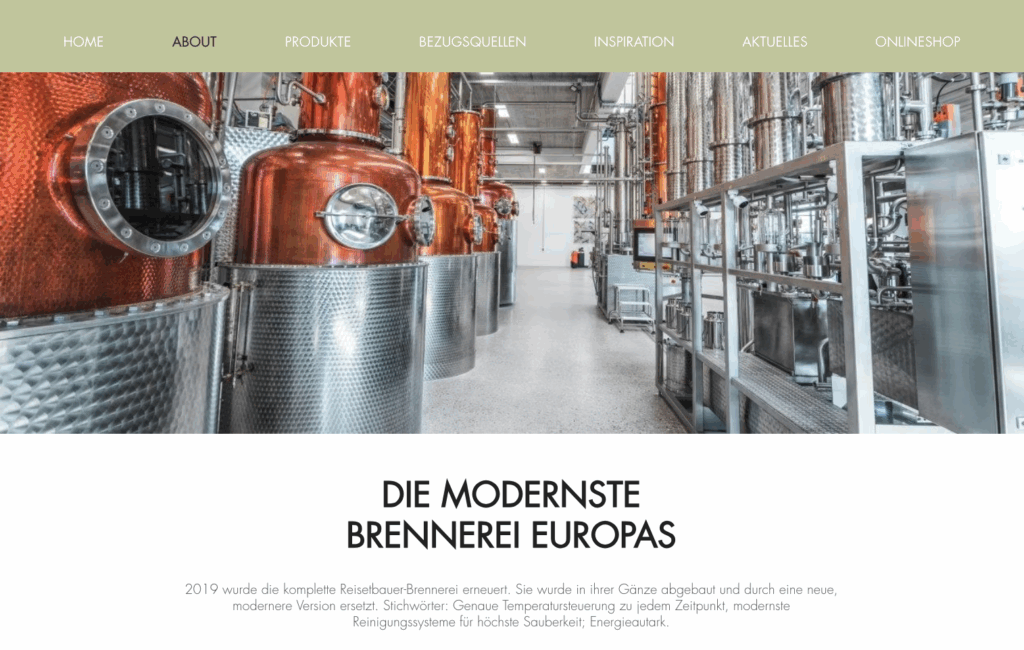
Grüner veltliner can be thirst-quenchingly fresh and fruity, with plenty of acidity (…) it can also be a full-bodied, intriguingly spicy, perhaps peppery white and well worth ageing – World Atlas of Wine
Fashionable, versatile, top-quality Austrian white wine variety – Wine Grapes
Besides the usual sources (World Atlas of Wine, Oxford Companion to Wine, Wine Grapes), the website from the Austrian Wine Marketing Board provides up-to-date and relevant information including videos, maps, and (free) learning content about wine in Austria including, natürlich na klar, grüner veltliner
– www.oesterreichwein.at (DE)
– www.austrianwine.com (EN)
Below the essentials, climate, terroir, history, KKK-WWW-TT, VWND, DAC, ÖTW, key producers, podcasts, books, und mehr.
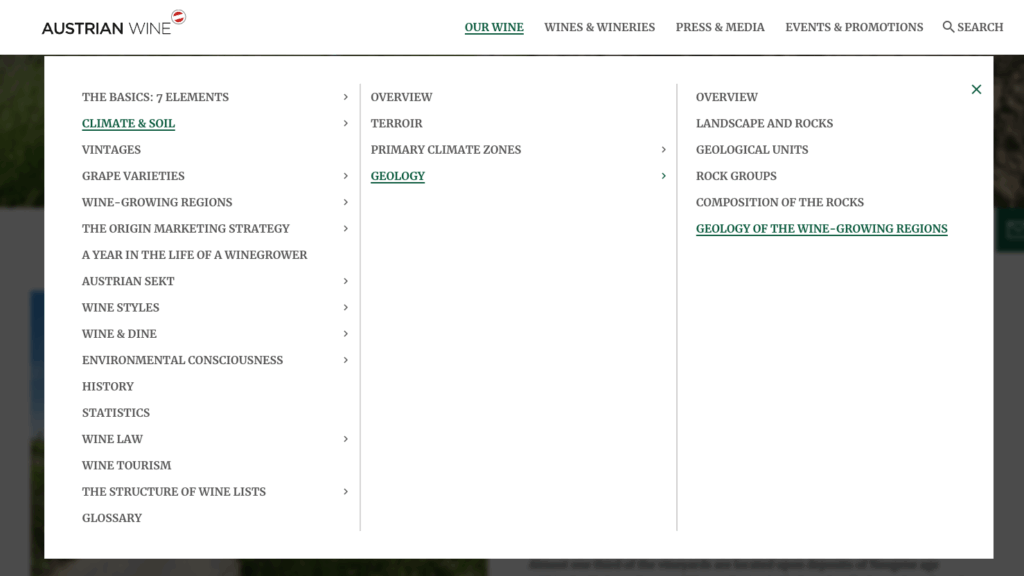
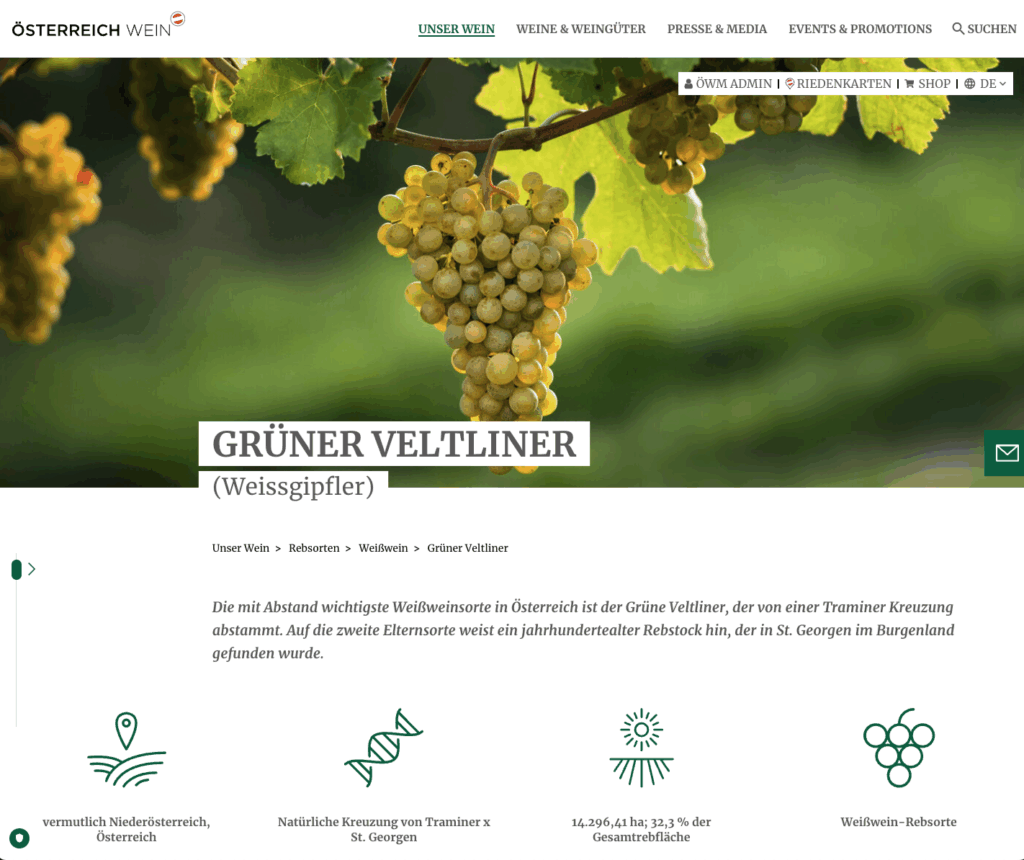
Grüner veltliner (gruener, GV, GruVe), in Austria also Weißgipfler, is a crossing between Traminer (Savagnin) and “St Georgener“.
According to the VIVC the variety has 78 synomyms (but not related to the other veltliners or gipflers).
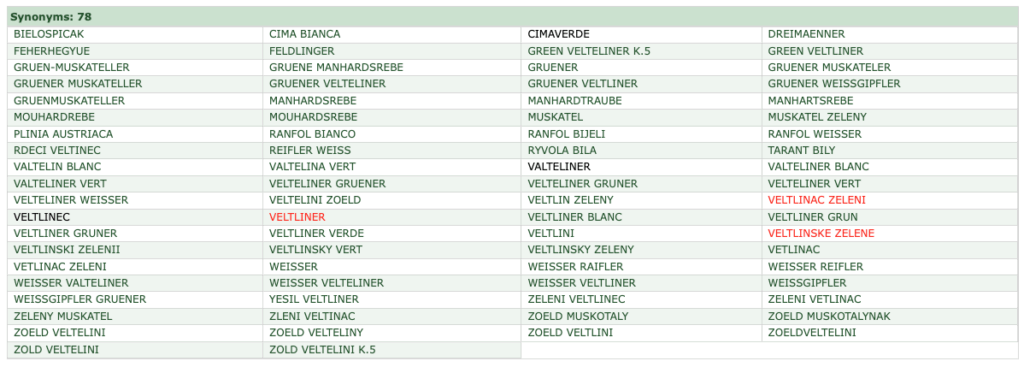
The variety is native to Lower Austria (Niederösterreich) and not to the Valtelina valley in Italy, as the name suggest (DE: Veltlin).
For some pronunciation guidance, you can watch this episode from the Weinschule.
Grüner in der Welt
Most of the vineyards growing grüner veltliner can be found within an hour drive from the city of Vienna.
Two-thirds are in Austria, mainly in Lower Austria and to the north in the Moravia wine region of the Czech Republic (veltlínske zelené), and to the east in Slovakia and Hungary (zöldveltelini).
In hectares: Austria 14,376, Slovakia 1,627, Czechia 1,538, Hungary 1,381 (99%).
- Which Winegrape Varieties are Grown Where? – University of Adelaide Press
In percentage (relative to the white varietes): Austria 75%; Slovakia 8%, Czechia 8%; Hungary 7%.
Smaller plots (but with premium wines) can be found in the US (60 ha), Italy (55 ha), New Zealand (43 ha), Australia (Adelaide Hills), Canada, Argentina and South Africa.
- Our Grüner Veltliner | Adelaide Hills
- Other New Zealand Wine Styles | New Zealand Wine
- Grüner Veltliner Goes Global Despite Tricky Name by Anne Krebiehl MW, Falstaff 01-2022
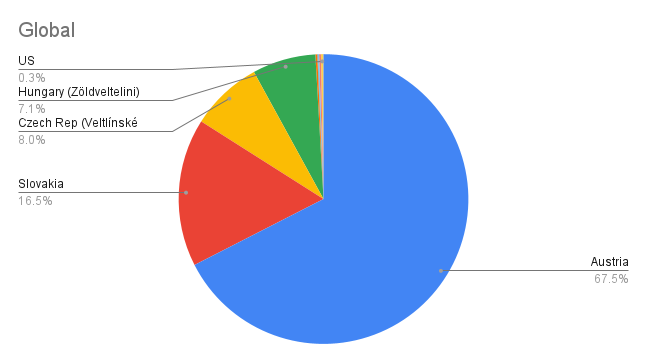
Grüner in Österreich
In Lower Austria, grüner covers 49% of total plantings. The percentage is even higher for the Wachau (64%), the valleys of the Traisen, Krems, and Kamp rivers (62%, 59%, 55%) and the plateau of Wagram (54%).
- KKK – Kamptal, Kremstal, Carnuntum
- WWW – Wagram, Wachau, Weinviertel,
- TT – Traisental, Thermenregion
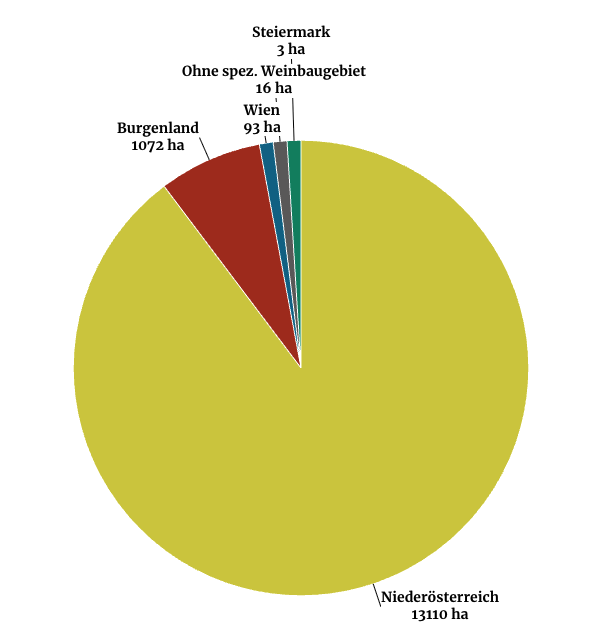
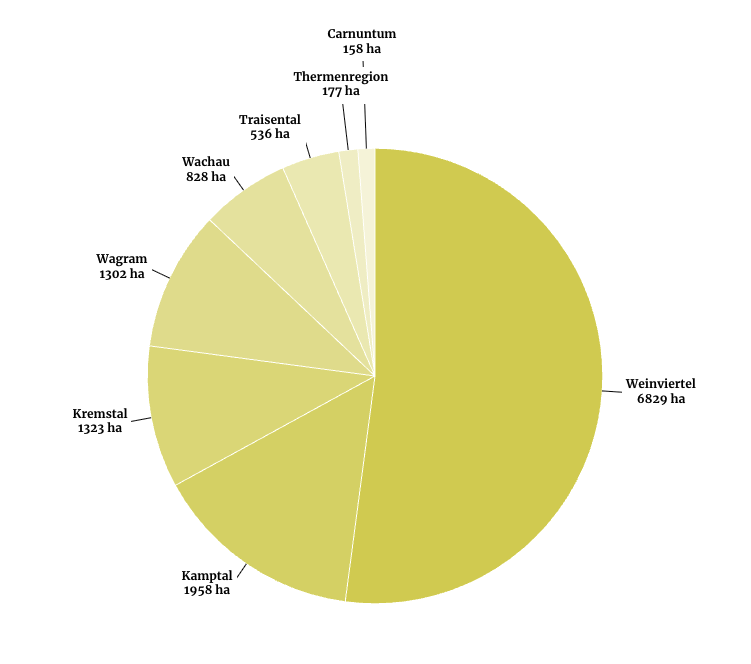
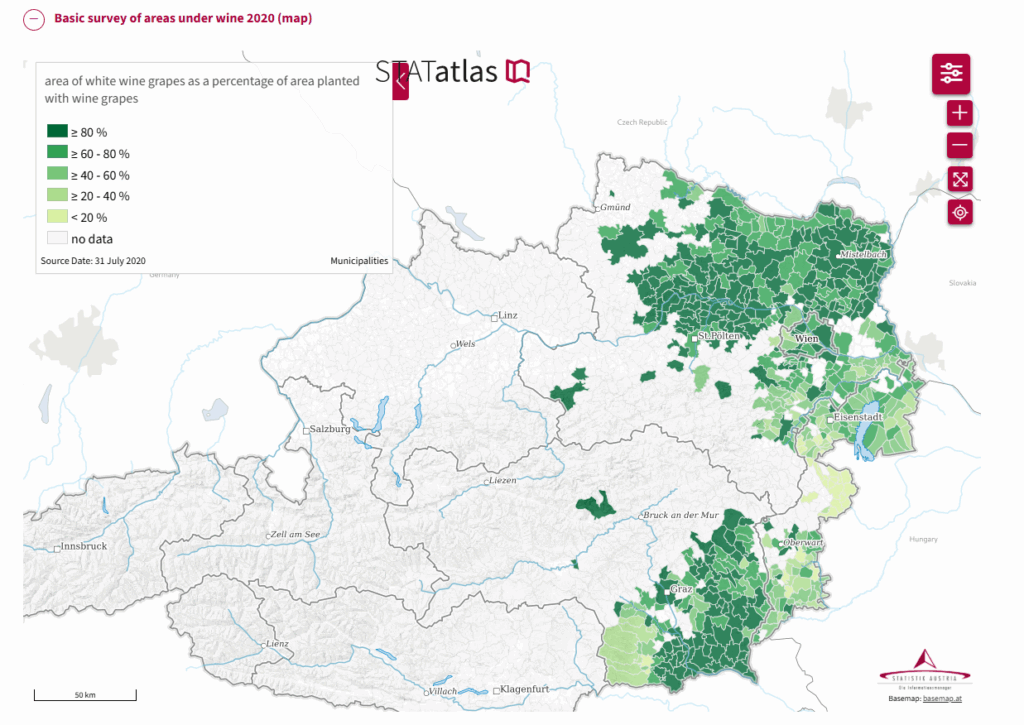
Stats
In 2024, in surface area Austria ranked 28th (OIV Country Statistics).

About 20% of the wine produced is exported.
- Austria Bucks (Some) Trends Meininger’s – Jan 2025
- The global economic situation is proving a challenge for Austrian wine exports – Austria Wine
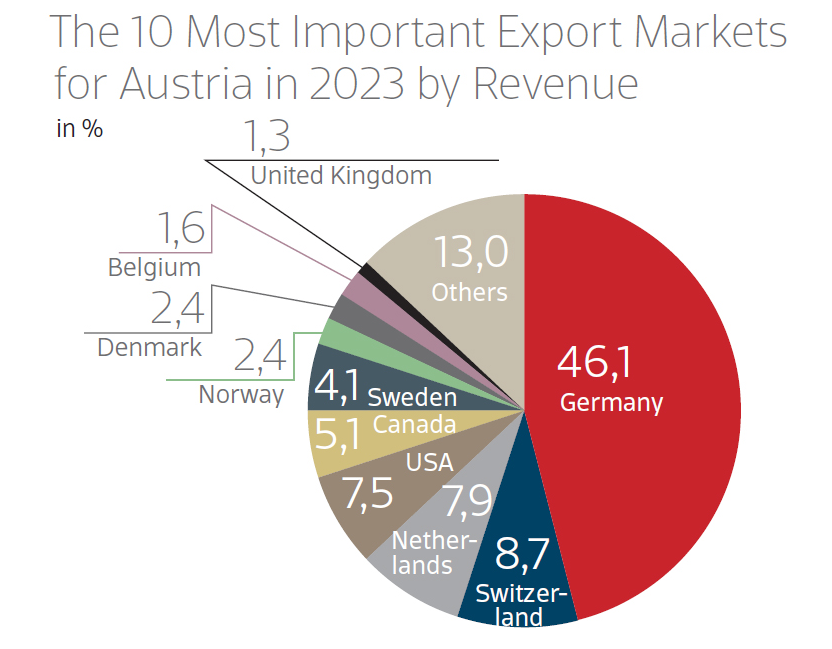
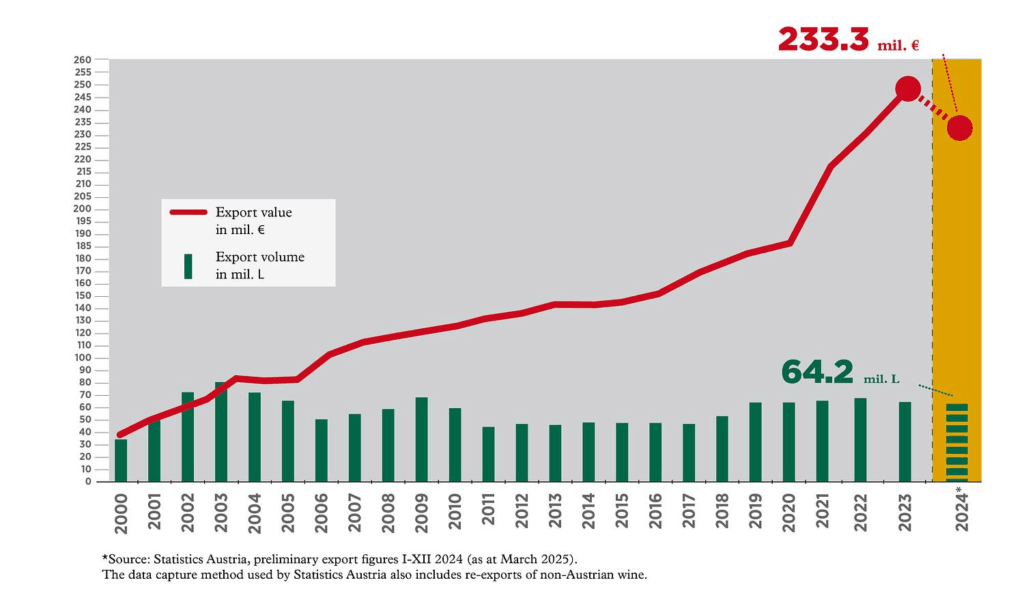
Wine Styles
Yields can be high and we find grüner both as bulk wine, or when yields are carefully managed (hand-picked, sustainable, etc.) as a premium variety with focus on quality and terroir.
It’s a versatile variety, capable of producting anything from base wine for Sekt via light, medium-bodied peppery wines for everyday refreshment through to concentraded and powerful expressions of the steep, river-hugging sites. – Wine Grapes
The wine is typically dry, full-bodied, peppery, or spicy, and with time in bottle it can start to taste positively Burgundian. – Oxford Companion to Wine
Climate
Together with müller-thurgau, riesling, and pinot noir, grüner veltliner is typically cultivated in cool climate winegrape areas.

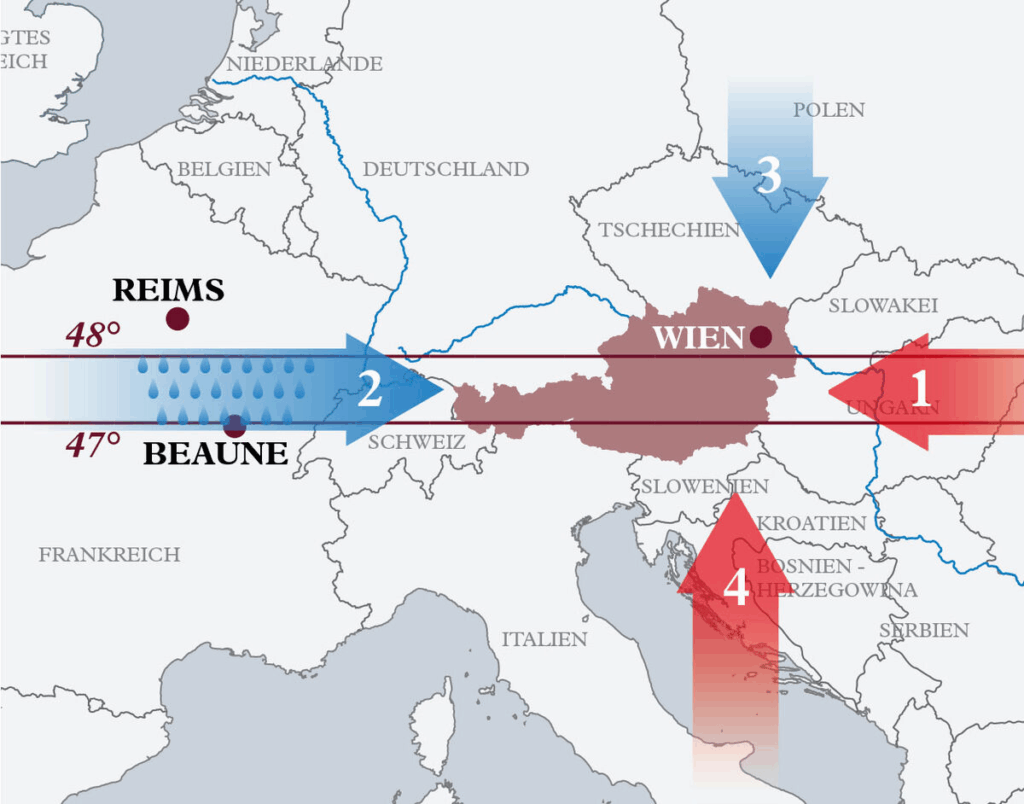
2. Temperate Atlantic climate
3. Cool air from the north
4. Illyrian Mediterranean climate
Geology
For generic information about the geology of the wine-growing regions, see
For information down to the ried level (vineyard), take a look at the Riedenkarten
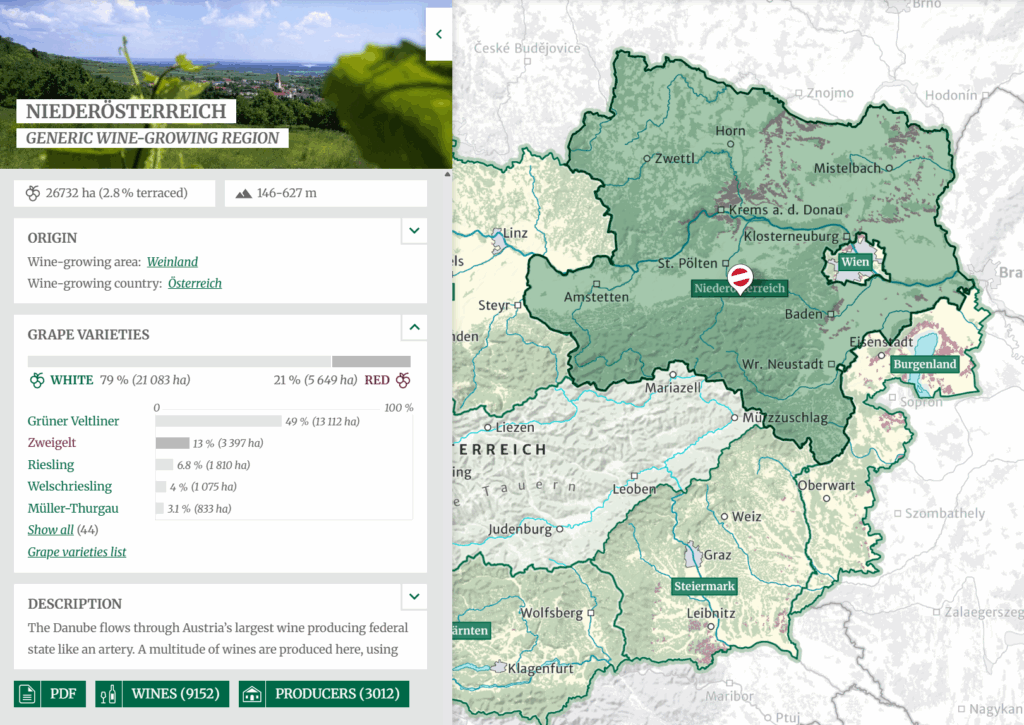
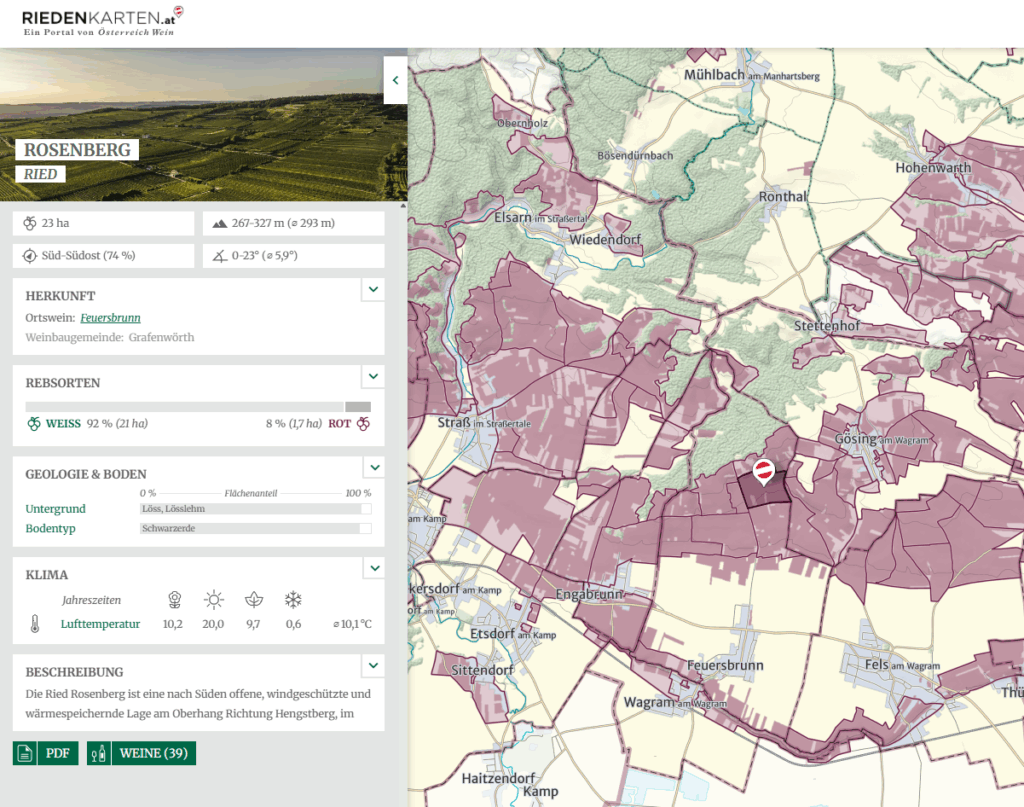
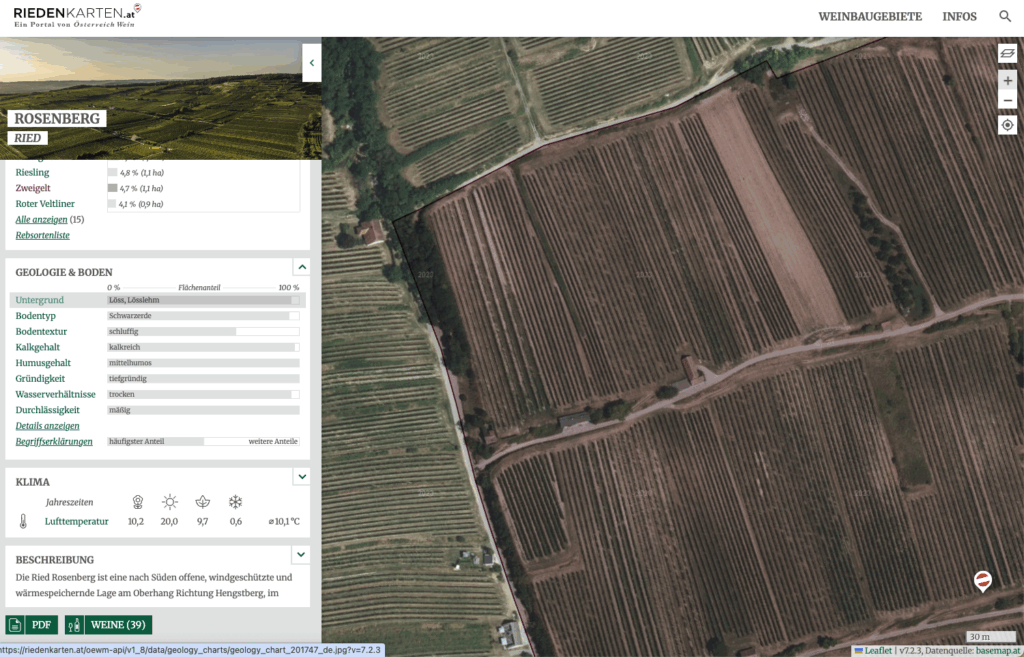
For each of the vineyard, geology and soil information is provided plus data about temperature, precipitation, and sunshine hours.

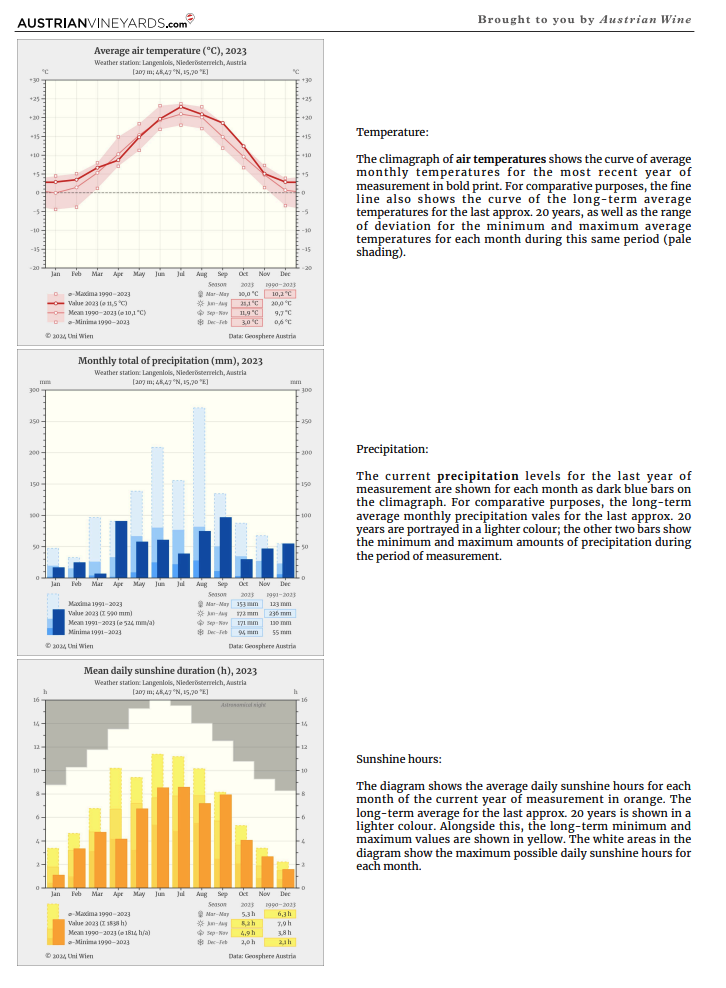
For each of the vineyard, the wines produced are listed.
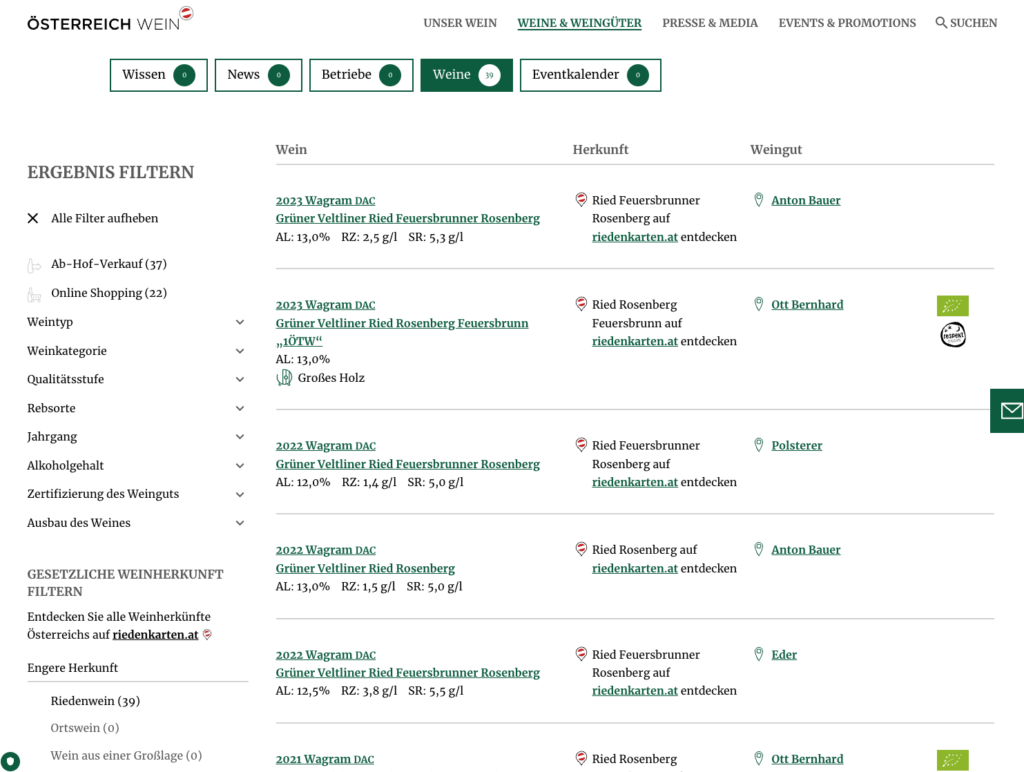
The mountains and hills are part of the Bohemian Massif, created between 400-300 million years ago, much older than the Alps nearby (50 million years). The bedrock is mostly granite and gneiss.
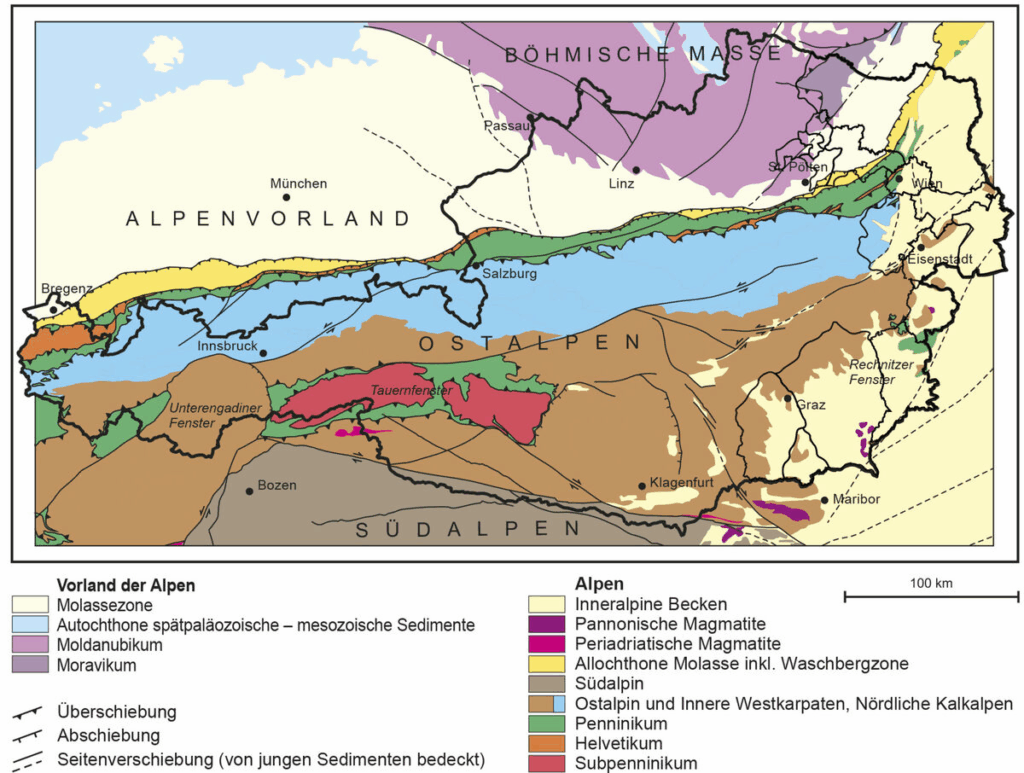
History
Grüner veltliner is native to Austria with references going back to the 18th century. The popularity of the variety, however, is of more recent date, starting in the 1950s, coinciding with the introduction of Lenz Moser’s high vine training system which facilitated mechanisation and higher yields (note that from 1945 to 1955 Lower Austria was under Soviet occupation/exploitation). Premium grüner veltliner production started in the mid 1980s.
The London Tasting of 2002 was a breakthrough internationally for Austrian Wine.
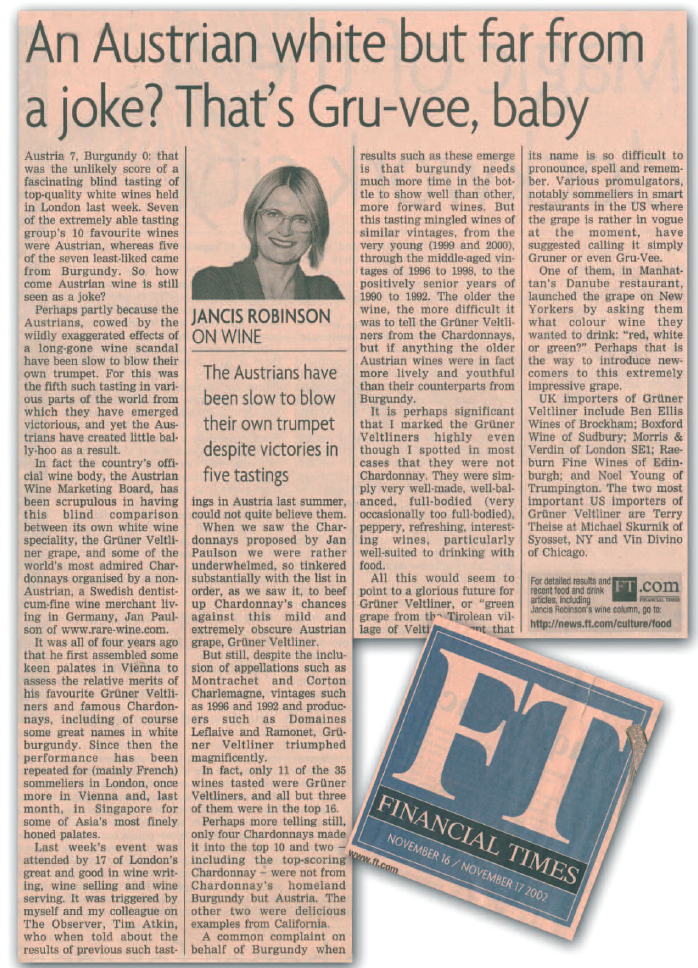
Until 1918, the area where we find most of the grüner veltliner growing today, circled around Vienna, was part of a single political entity: the Habsburg Monarchy, Austrian Empire, and Austria-Hungary dual monarchy.
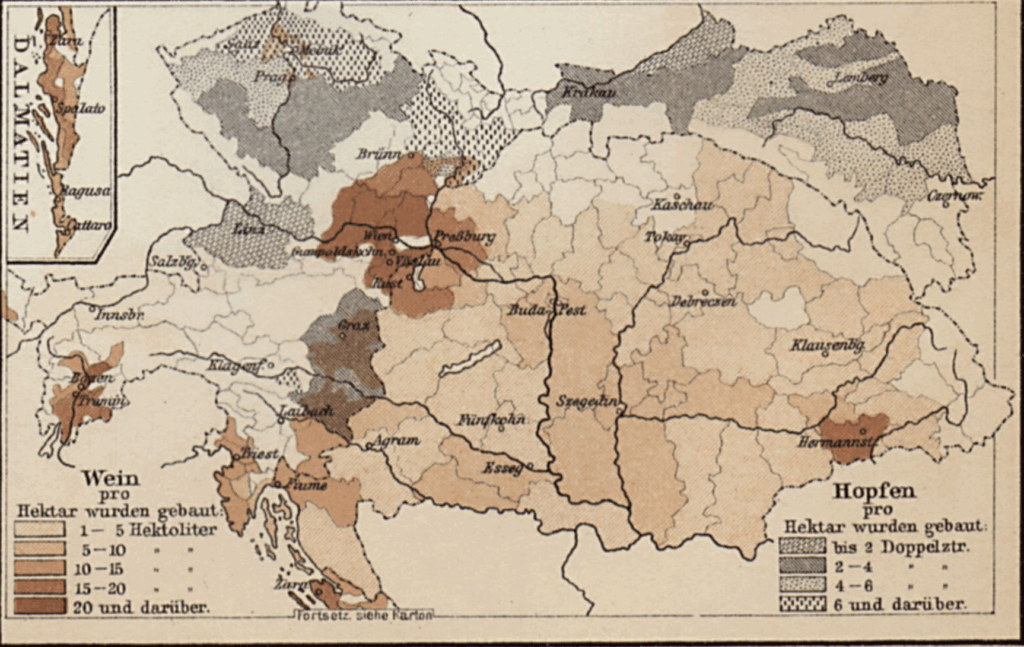
Qui bon vin boit Dieu voit
Wine production in Austria goes back to Celts (i.e. before the Romans!).
More recent are the monasteries founded by the Benedictines (Göttweig 1083), the Augustines (Neubourg 1114) and the Cistercians (Stift Heiligenkreuz, Freigut Thalern, and Schloss Gobelsberg.
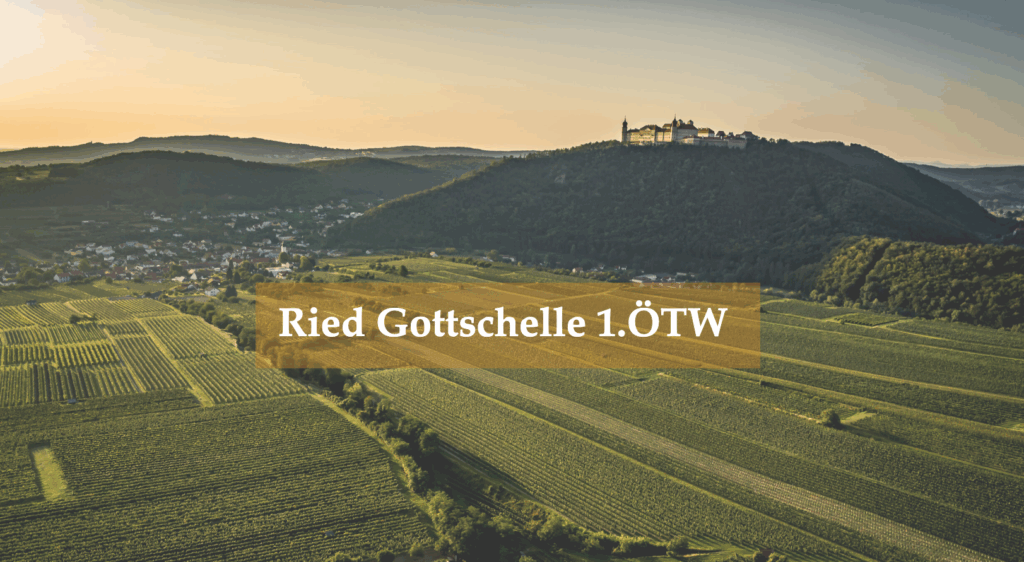
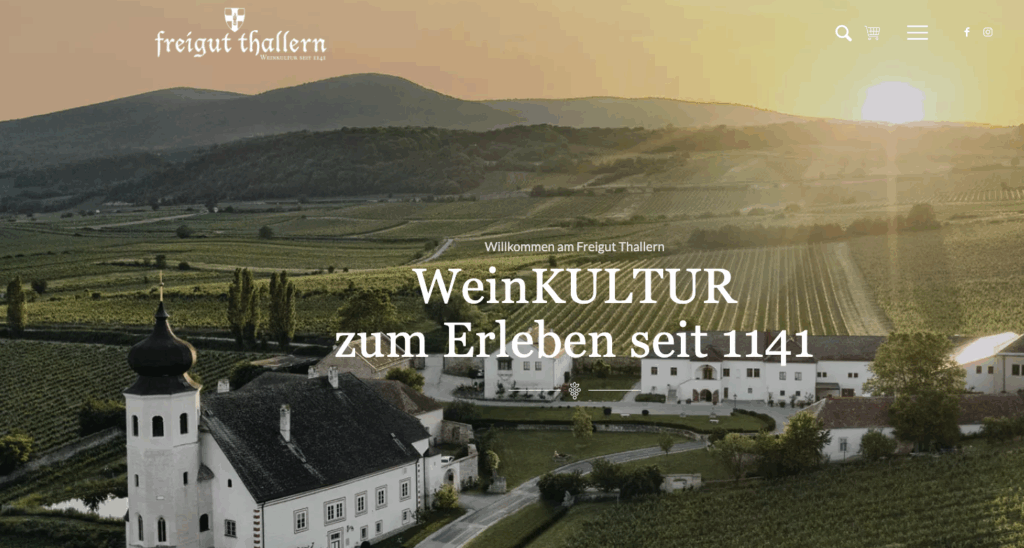
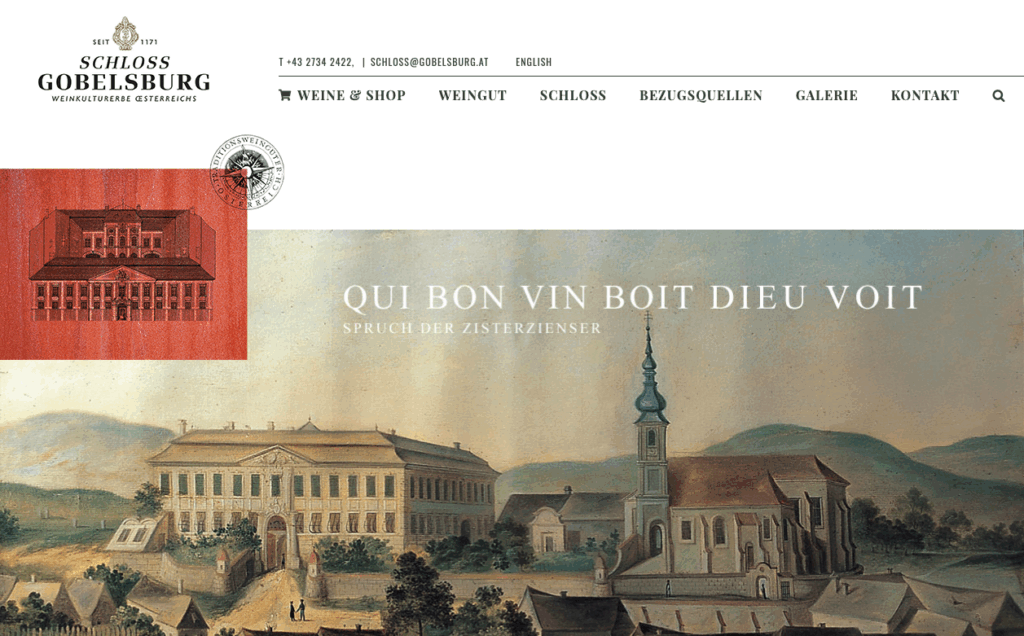
Klosterneuburg
Still in the days of the Austrian Empire, the first Weinbauschule was founded in Vienna at the Klosterneuburg in 1860 (Geisenheim 1872, Montpellier 1872, Bordeaux 1880).
The zweigelt crossing by Dr Zweigelt and KMW (Klosterneuburger Mostwaage) are some of its innovations.
Qualitätswein
Vinea Wachau Nobilis Districtus
The Vinea Wachau (Vinea Wachau Nobilis Districtus) was founded in 1983 as an association of winemakers in the Wachau wine-growing area. The wine styles Steinfeder®, Federspiel® and Smaragd® are registered trademarks.
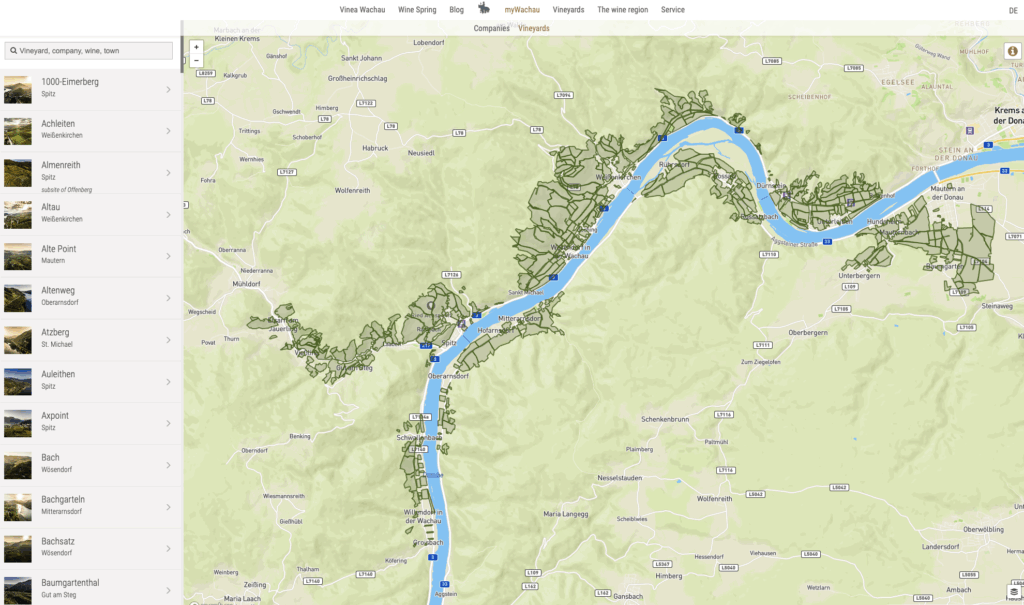
ÖTW – Österreichische Traditionsweingüter
The ÖTW is a winegrowers’ association, founded in 1992 and headquartered in Krems an der Donau. According to the ÖTW charter, its primary objective is to create a classification of Austria’s vineyards (»Ried«). This should provide consumers with an element of orientation in navigating Austria’s myriad appellations of origin.
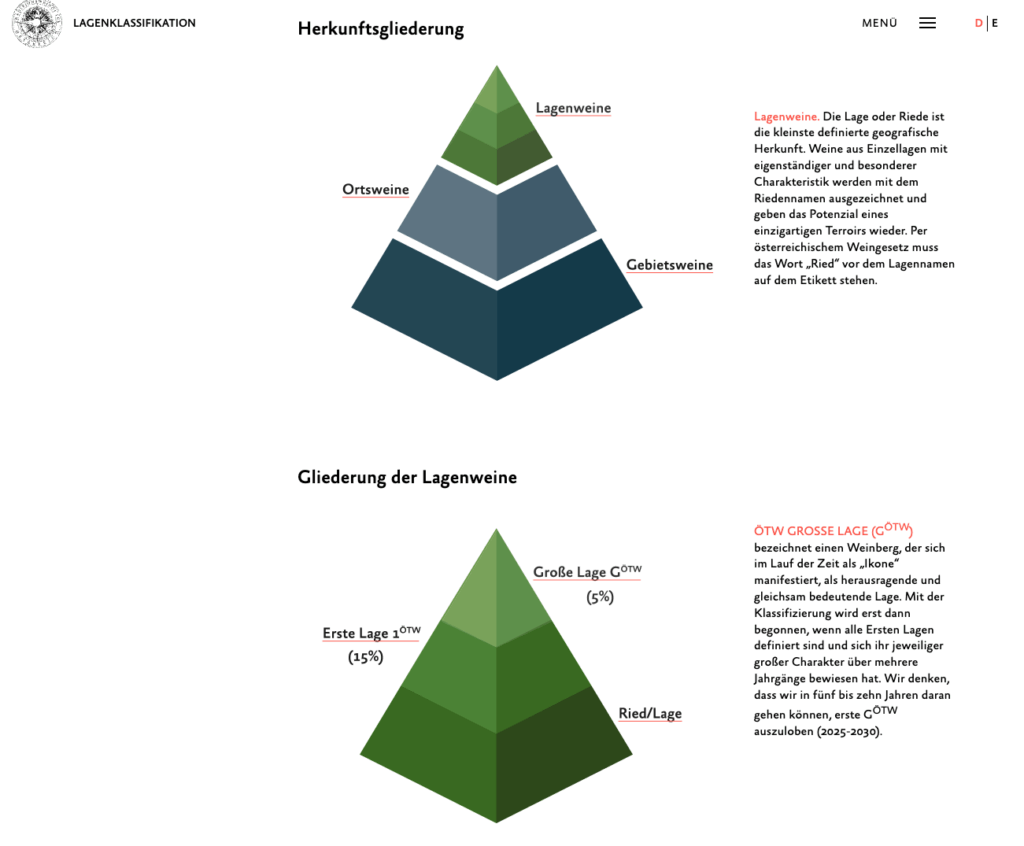
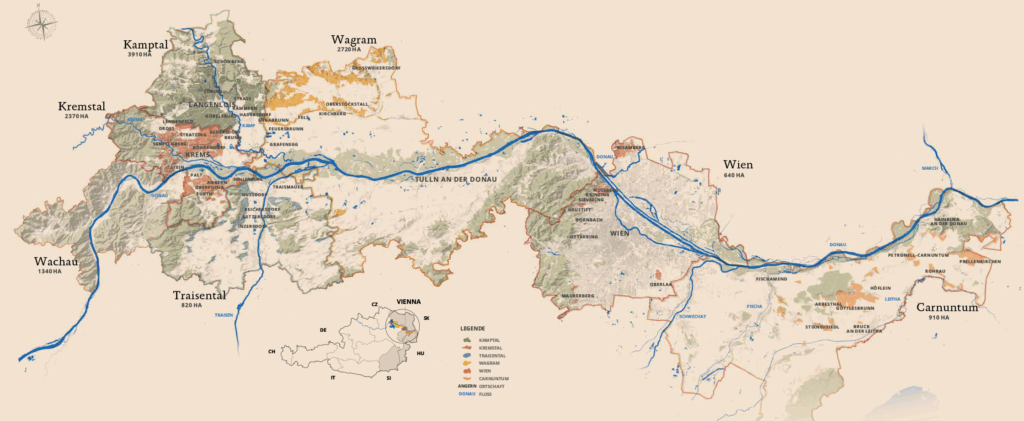
Districtus Austriae Controllatus
There are 18 gebietstypische österreichische Qualitätsweine.
The Wine Quarter, Traisental, Kremstal, and Kamptal joined early. Wachau, which already had a quality branding, and Wagram associated recently.
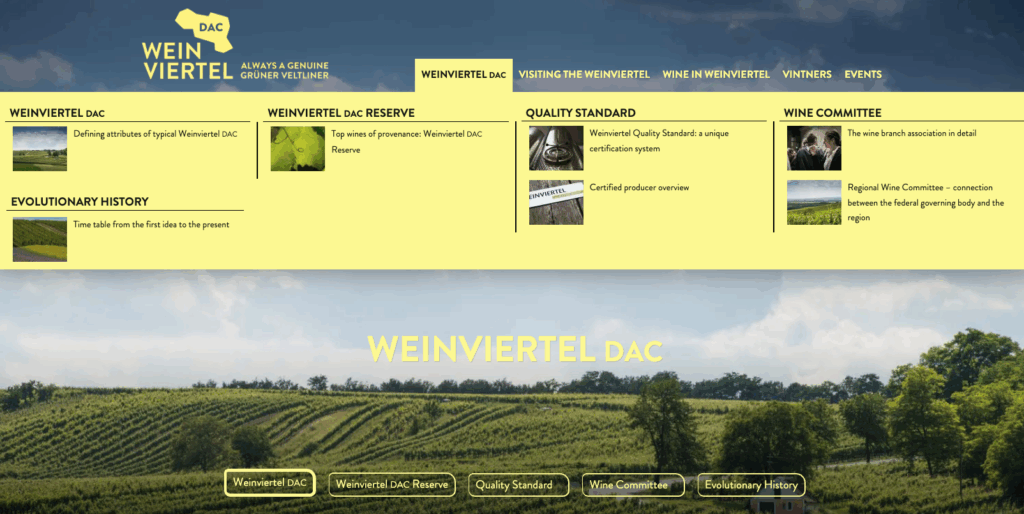
- Mittelburgenland DAC (2006)
- Traisental DAC (2006)
- Kremstal DAC (2007)
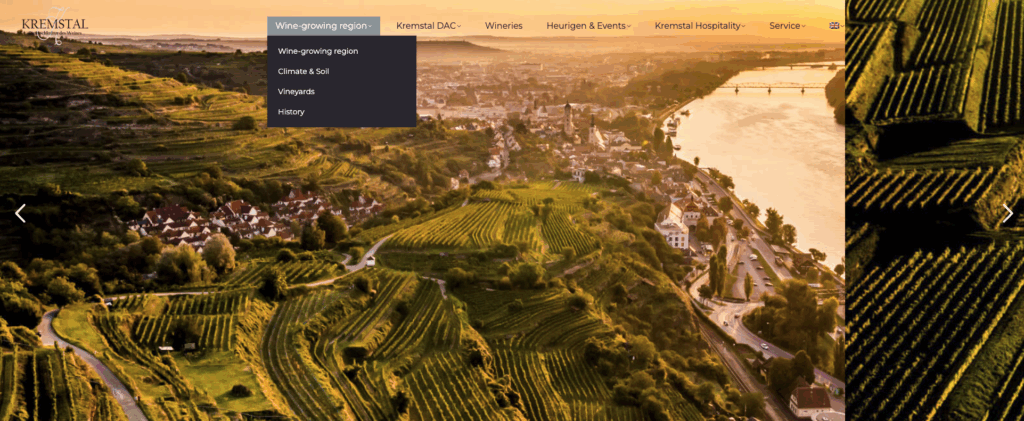
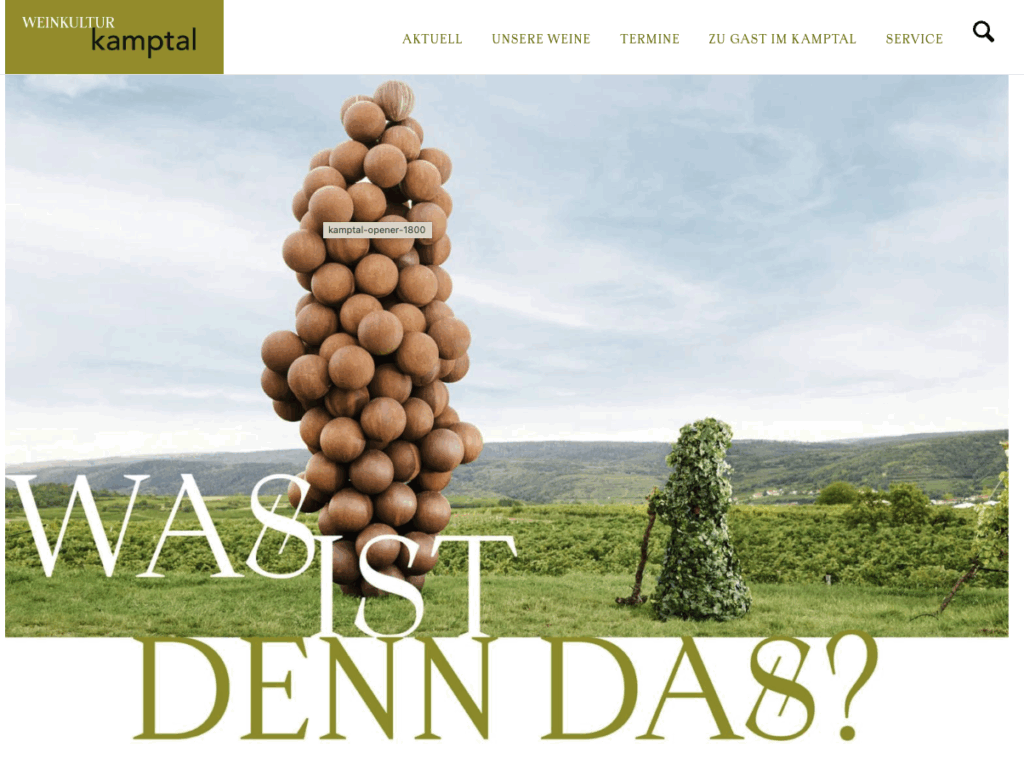
- Leithaberg DAC (2009)
- Eisenberg DAC (2010)
- Neusiedlersee DAC (2012)
- Wiener Gemischter Satz DAC (2013)
- Vulkanland Steiermark DAC (2018)
- Südsteiermark DAC (2018)
- Weststeiermark DAC (2018)
- Rosalia DAC (2019)
- Carnuntum DAC (2019)
- Wachau DAC (2020)
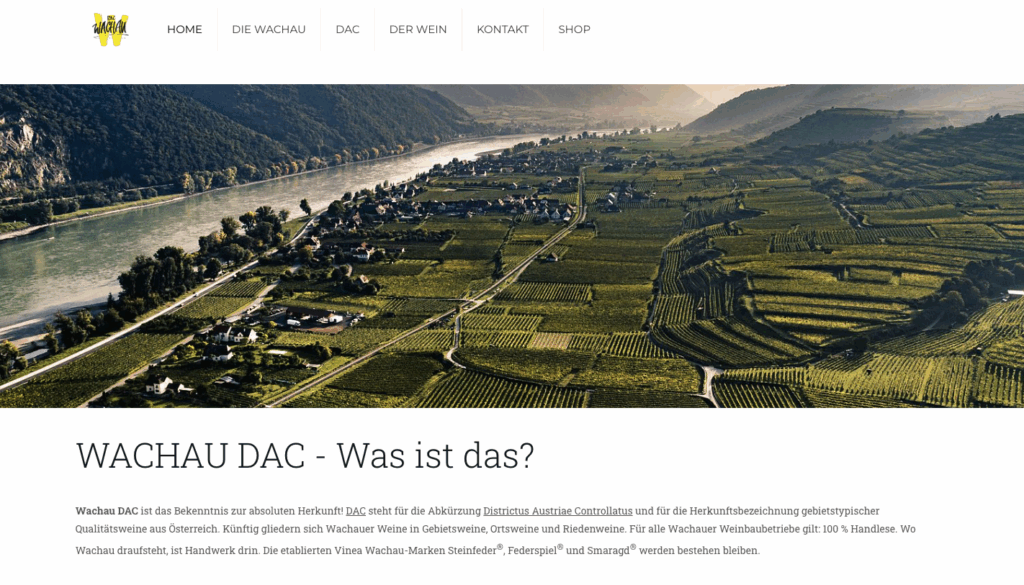
- Ruster Ausbruch DAC (2022)
- Thermenregion DAC (2023)
- Wagram DAC (2023)
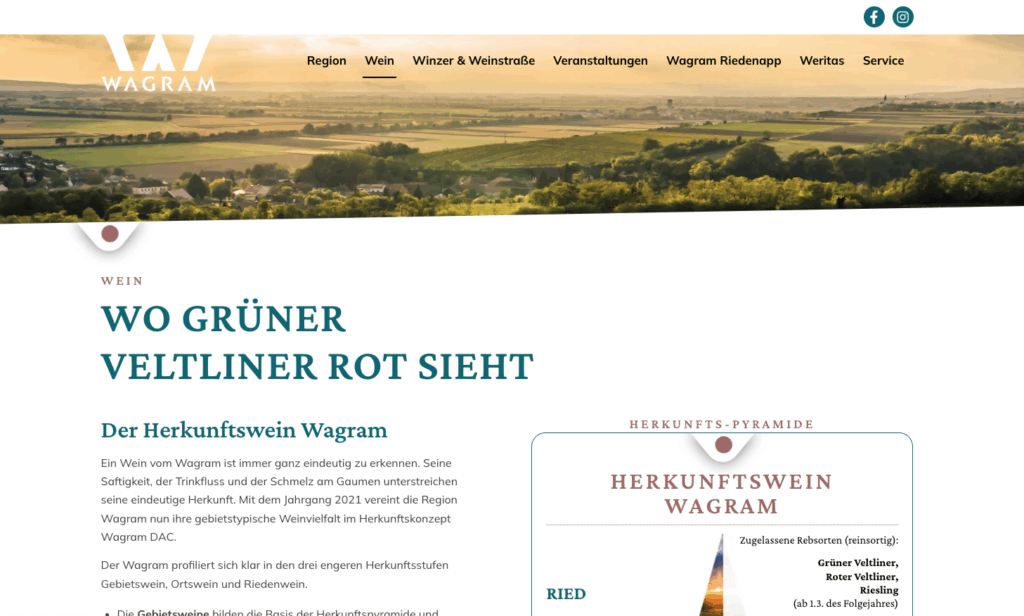
Premium Estates Wein
Premium Estates of Austria – an outstanding portfolio of wines, distillates and vinegars that come from the most sought-after regions of Austria.
Wineries
The wineries listed below have been mapped on Google Earch
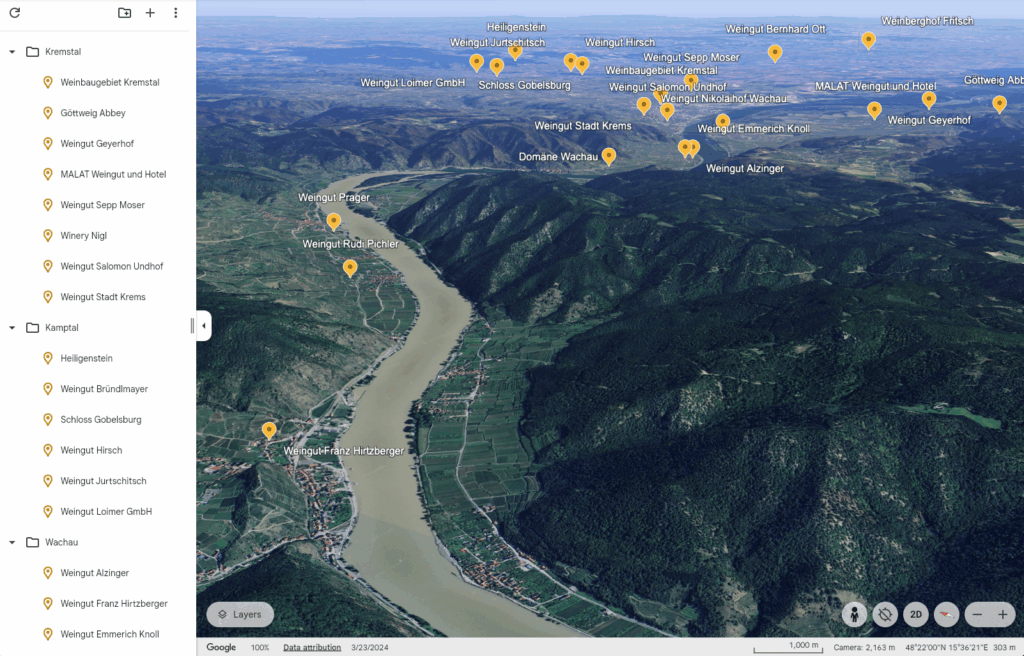
Wachau Producers
For an overview and rating of 176 Wachau wineries, see
Leo Alzinger
Podcast
Leo Alzinger discusses the key vineyard holdings of the family, as well as some of the realities of climate change, and the conditions of some recent vintages. He also details some of the changes that have occurred at the winery as some techniques regarding lees contact and sulphur use have been fine-tuned. And Leo explains some of the differences between Gruner Veltliner and Riesling, both in terms of growing them in the vineyards and working with them in the winery.
- Leo Alzinger – I’ll Drink to That (279, 2015) by Levi Dalton
Franz Hirtzberger
Emmerich Knoll
Nikolaihof
F.X. Pichler
Rudi Pichler
Weingut Prager
Domäne Wachau
- www.domaene-wachau.at
- Vinea Wachau
- falstaff **** [ Winemaker of the Year 2024/25 ]
- wine-searcher
Wagram Producers
For an overview and rating of 98 Wagram wineries, see
Weinberghof Fritsch
Bernhard Ott
Kamptal
For an overview and rating of 138 Kamptal wineries, see
Weingut Bründlmayer
Podcast
- Bründlmayer – I’ll Drink to That (157, 2014) by Levi Dalton (Podcast)
Schloss Gobelsburg
Podcast
- Schloss Gobelsburg – I’ll Drink to That (149, 2014) by Levi Dalton
Article
- Michael Moosbrugger of Schloss Gobelsburg: All calm in Kamptal by Margaret Rand (February 15, 2023)
Book
- Schloss Gobelsburg, Oenocultural Heritage Austria [978-3710606045]
Weingut Hirsch
Podcast
- Johannes Hirsch – I’ll Drink to That (177, 2014) by Levi Dalton
Weingut Jurtschitsch
Weingut Fred Loimer
Podcast
- Fred Loimer – I’ll Drink to That (224, 2014) by Levi Dalton
Kremstal
For an overview and rating of 135 Kremstal wineries, see
Geyerhof
Weingut Malat
Vitikultur Moser
Weingut Nigl
Salomon-Undhof
Weingut Stadt Krems
Book
Sekt Austria
There are over 2,000 producers of schaumwein in Austria, a little over 300 produce Sekt Austria Große Reserve, the top of the pyramid, where we may find single variety grüner veltliner on the label.

Heritage
UNESCO World Heritage
The Wachau Cultural Landscape between Melk and Krems is a UNESCO World Heritage site with terraced vineyards.
World’s Best Vineyards
Domäne Wachau and Schloss Gobelsberg have made the list of the world’s best vineyards the last couple of years. In 2024, on numer 33 and 99 respectively.
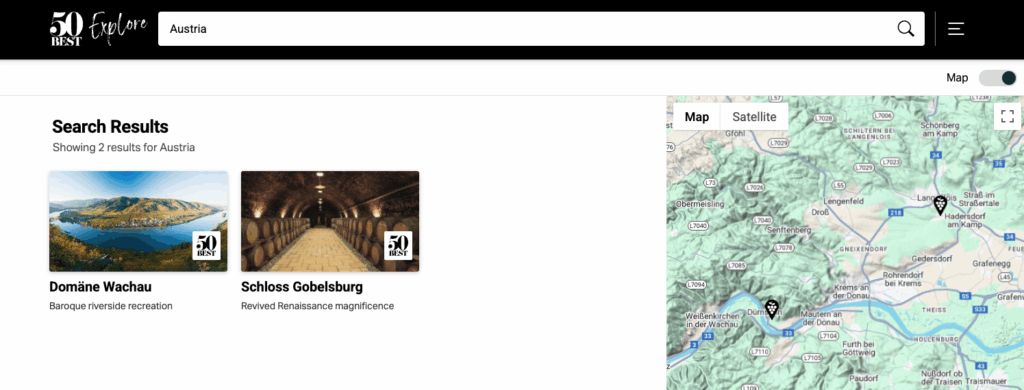
To Learn More
- www.weinakademie.at
- www.niederoesterreich.at/wein
- Grüner Veltliner – Austrian Wine
- Grüner Veltliner – Wikipedia (EN)
- Grüner Veltliner – Wikipedia (DE)
- Vitis International Variety Catalogue (VIVC) – Grüner Veltliner
- Grüner Veltliner (Federal Ministry of Agriculture and Forestry, Climate)
- Austrian Wine | Literaturverzeichnis
- www.austrianwine.com/press-media/brochures
- www.austrianwine.com/press-media/presentations-austrian-wine
Books
- The Wines of Austria, Stephen Brook, 2nd ed. Académie du Vin Library [9781913141622]


Training Manual (English, Deutsch, Français)
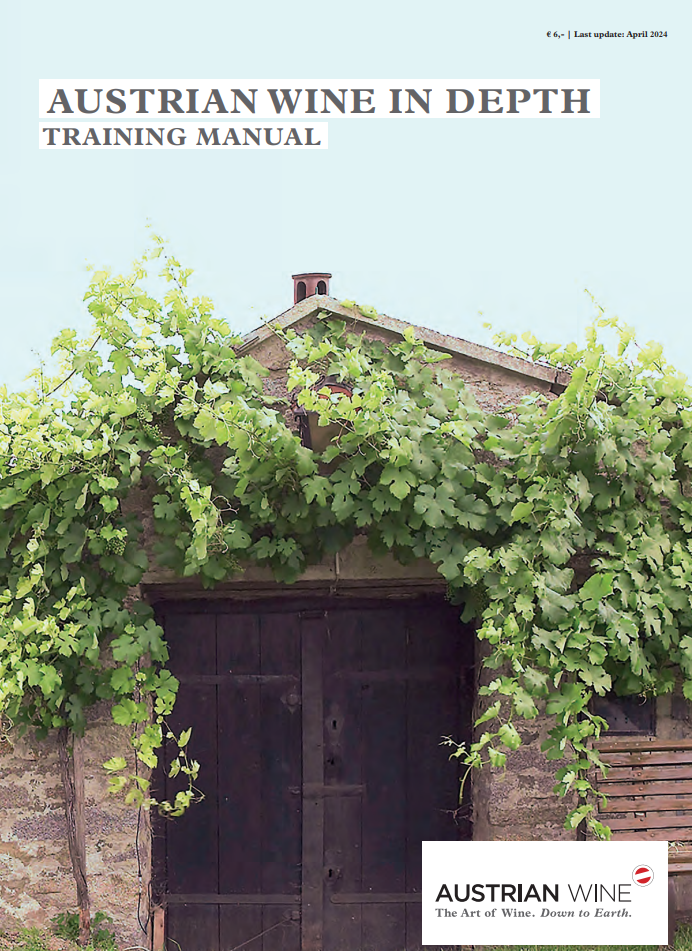
Magazines
Vinaria
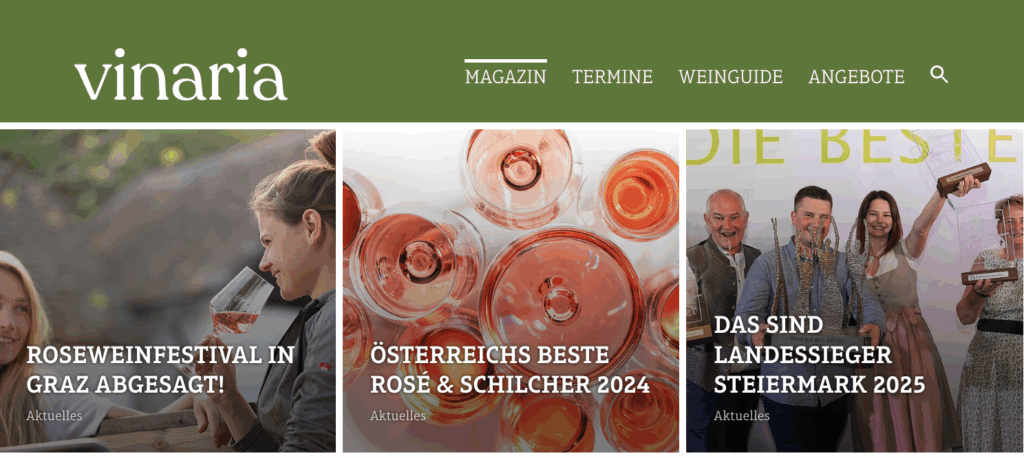
Falstaff
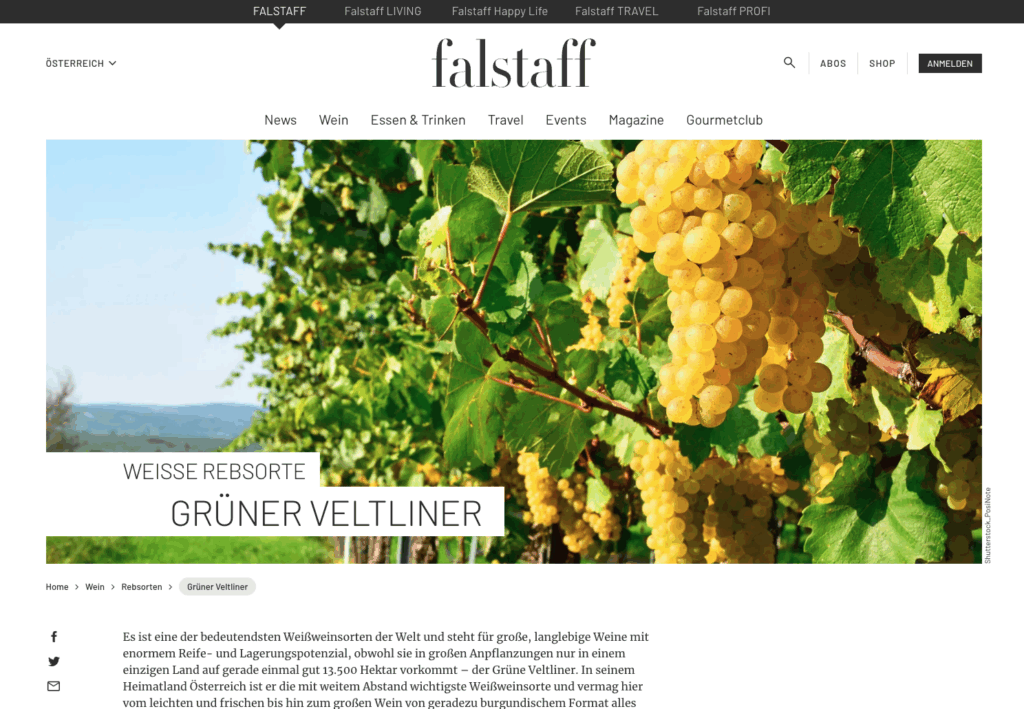
Events
VieVinum – International Wine Festival from 16 to 18 May 2026

Videos
Podcasts
I’ll Drink To That with Levi Dalton
Levi Dalton interviewed several winemakers from Austria in 2014 and 2015. Some episode were already mentioned. Here a few more
Gerhard Kracher
Gerhard Kracher manages his family wine estate in Austria’s Burgenland, and is also a partner with Aldo Sohm in a project specializing in Grüner Veltliner from the Weinviertel.
Bernhard Stadlmann
Bernhard Stadlmann works with his family at Weingut Stadlmann, their winery in Austria’s Thermenregion.
Fritz Wieninger
Fritz Wieninger runs the Wieninger winery in Vienna, Austria.
Hans Reisetbauer
Hans Reisetbauer is a distiller working in Austria.
- Hans Reisetbauer – Episode 257 (April 2015)
- www.reisetbauer.at
- Qualität Schafft Freundschaft: 20 Years of Partnership with Hans Reisetbauer
